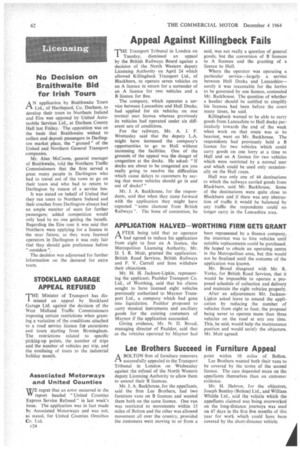Appeal Against Killingbeck Fails
Page 64

If you've noticed an error in this article please click here to report it so we can fix it.
THE Transport Tribunal in London on
Tuesday, dismissed an appeal by the British Railways Board against a decision of the North Western deputy Licensing Authority on April 24 which allowed Killingbeck Transport Ltd., of Blackburn, to operate seven vehicles on an A licence in return for a surrender of an A licence for two vehicles and a B licence for five.
The company, which operates a service between Lancashire and Hull Docks, had applied for six vehicles on one normal user licence whereas previously its vehicles had operated under six different sets of conditions.
For the railways, Mr. A. J. F. Wrottesley said that the deputy L.A. might have increased the company's opportunities to go to Hull without increasing the facilities. One of the grounds of the appeal was the danger of congestion at the docks. He asked: "If docks are about to be congested are you really going to resolve the difficulties which cause delays to customers by saying that more vehicles should go in and out of docks?"
Mr. J. A. Backhouse, for the respondents, said that when they came forward with the application they might have expected "some clamour from British Railways ". The bone of contention, he said, was not really a question of general goods, but the conversion of B licences to A licences and the granting of a licence to Hull.
Where the operator was operating a particular service—largely a service between Hull Docks and Lancashire— surely it was reasonable for the lorries to be governed by one licence, contended Mr. Backhouse. The question of whether a haulier should be entitled to simplify his licences had been before the court many times, he said.
Killingbeck wanted to be able to carry goods from Lancashire to Hull docks particularly towards the end of the week when work on that route was at its heaviest, went on Mr. Backhouse. The respondents had previously held a B licence for two vehicles which could carry goods on one lorry at a time to Hull and an A licence for two vehicles which were restricted by a normal user and which could be used only occasionally on the Hull route.
Hull was only one of 44 destinations to which the railways carried goods from Blackburn, said Mr. Backhouse. Some of the destinations were quite close to Blackburn and if there was any abstraction of traffic it would be balanced by any traffic the respondents could no longer carry in the Lancashire area.
































































































































































































